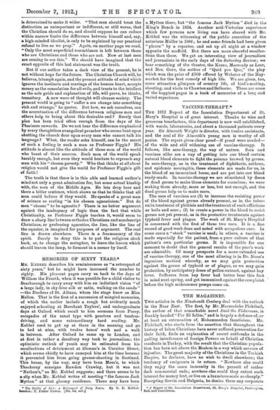MEMORIES OF SIXTY YEARS.* Mn. KEBBED describes his reminiscences as
"a retrospect of sixty years," but be might have increased the number to eighty. His pleasant pages carry us back to the days of William the Fourth, when it was possible for a child visitor to Scarborough to carry away with him an indistinct vision "of a large lady, in sky-blue silk or satin, walking on the sands" —the Duchess of St. Albans, whom the stage knew as Miss Mellon. That is the first of a succession of mingled memories, of which the earlier include a rough but evidently much enjoyed schooling at Merchant Taylors', and undergraduate days at Oxford which recall to him sermons from Pusey, escapades of the usual type with proctors and tandem- driving, and some extraordinary bard reading. Mr. Kebbel used to get up at three in the morning and go to bed at nine, with twelve hours' work and a walk in between. After Oxford he came up to London, and at first in rather a desultory way took to journalism; the optimistic outlook of youth may be estimated from his recollections of detainment at Sloman's in Cursitor Street, which seems chiefly to have annoyed him at the time because it prevented him from going grouse-shooting in Scotland. This house, by the way, may have been Moss's, to which Thackeray consigns Rawdon Crawley, but it was not "Nathan's," as Mr. Kebbel suggests ; and there seems to be a. slip when Mr. Kebbel writes of meeting "the famous Jack Mytton." at that gloomy residence. There may have been
• The Battle of 14'e, a Retrospect of &sty rears. By T. E. Kebbel. London: T. Fisher Unwin. [10s. 6d. net.] a Mytton there, but "the famous Jack Mytton " died in the King's Bench in 1834. Another mid-Victorian experience which few persons now living can have shared with Mr. Kebbel was the witnessing of the public execution of the notorious Muller in 1864; he and some friends had been given " places " by a reporter, and sat up all night at a window opposite the scaffold. But there are more cheerful recollec- tions than these. We get an interesting view of journalism and journalists in the early days of the Saturday Review; we hear something of the theatre, the Keens, Macready as Lear, and Mrs. Gore, the author of "Quid pro Quo," the play which won the prize of £500 offered by Webster of the Hay- market for the best comedy of high life. We are given, too, some attractive glimpses of country life, of bird's-nesting, shooting, and visits to Chawton and Seaborne. These are some of the happiest pages in a book of memories of a long and varied experience.






































































 Previous page
Previous page